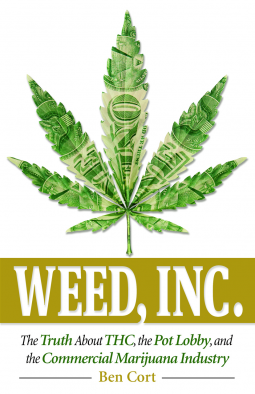
Weed, Inc.
The Truth About the Pot Lobby, THC, and the Commercial Marijuana Industry
by Ben Cort
This title was previously available on NetGalley and is now archived.
Send NetGalley books directly to your Kindle or Kindle app
1
To read on a Kindle or Kindle app, please add kindle@netgalley.com as an approved email address to receive files in your Amazon account. Click here for step-by-step instructions.
2
Also find your Kindle email address within your Amazon account, and enter it here.
Pub Date Sep 19 2017 | Archive Date Oct 12 2018
HCI Books | HCI
Description
If you ask a young person today about weed, what comes to mind isn't rolling a joint or taking a bong hit, getting the munchies and chilling out. In fact, cannabis today is practically an entirely different product than what most people think it is, so before you start saying, 'What's the big deal about legalizing weed?' there's a lot you should know.
The chill is gone and the heat is on. In the 1970s, mellowing out with a joint and a slice of pizza was a whole different experience—you'd have to smoke about 15 joints in 1970 to get the same high as just one joint in 2017. Yet today, if you talk to people who use recreational weed, more than likely they aren't even thinking about rolling one up—they're thinking 'concentrates.' Check this out: in the 1970s THC levels in cannabis were less than 4%, today it averages 25%, but in concentrates, THC levels can be as high as 80%, and that's where the train jumps the tracks. Concentrates contain the highest levels of THC available, and they come in a whole new form: thick oils, smooth buttery substances (wax), or rock-hard like a Jolly Rancher. You don't roll this stuff up and smoke it. In order to combust, these new forms require about 700 degrees of heat—you'd need a red-hot needle, super-heated knife, or a vaporizer made to handle that kind of heat (Did images of people smoking crack or meth come to mind? They should).
There's always room for dessert! Ah yes – the booming appetite for edibles. Super-potent. You'd have to eat a whole pan of 'herb brownies' to get the concentration of THC that's in today's lollipops or gummies. How cool is that?
Just ask kids—after all, they're the target market for weed and concentrates today. Since most older consumers have been using weed for decades, they're already on board. In Colorado, advertisements flood newspapers and billboards with two-for-ones, free samples, guest appearances by superheroes and adorable Koala spokes-bears on special days like, 'Waxy Wednesdays' and 'Shatterdays.' This young and growing market of kids are easily swayed by cool packaging and images like the one of Cookie Monster sharing a plate of 'special cookies,' which is painted on the outside of a Colorado dispensary located right beside a kindergarten.
Industrialization—the key to safe, regulated products. Okay, now it really is time to wake up and smell the coffee. With industrialization comes political agendas, overpaid lobbyists, big marketing budgets, and not far behind, monopolies on manufacturing and distribution. Small farmers will feel the pinch as prices soar with the domination of corporate America under the guise of good old capitalism. There goes the neighborhood.
In Weed, Inc. Cort responds to statements like:
Plus, he includes definitions of pertinent terms, such as: 710, 420 and 3750, dabbing, waxing, vaping, A-bomb, shatter, Budtender, ditch weed and more. We each have our own ideas of what the world of legal, recreational cannabis looks like, but more than likely, we know far less than we think we know. This seminal book will take you into the real world of legalized weed and open your eyes to topics such as:
Environmental concerns (water, fertilizers, power, etc.) Medical concerns Social justice The lobby (what businesses stand to gain by this new industry) Law enforcement Organized crime FDA involvement And much moreFor every individual, every school and public library, and every bookstore committed to carrying the most up-to-date information on topics that affect families, government policy, industry, and social systems, this book is indispensable.
A Note From the Publisher
Why we should stop talking about weed like it's 1970: the truth about that 'peaceful easy feeling'
Marketing Plan
- Regional and national publicity
- Tattered Cover appearance October 5
- Miami Book Fair 2017 featured speaker
- Perpetual speaking tour
- Direct mail promotions to more than 200K people
- Book giveaways on Goodreads and LibraryThing
Ben
Cort spent a decade inside the drug and alcohol addiction treatment
field and is now is a consultant to the industry. Ben joined the drug
policy conversation at the national level in 2012. He was part of the
'No on 64' campaign, and following the amendment's passage—which changed
the Colorado constitution to allow for a statewide drug policy for
cannabis—he was appointed to the Board of Directors of Project SAM
(Smart Approaches to Marijuana) as well as NALGAP (the National
Association of Lesbian, Gay, and Transgender Treatment Providers). Ben's
passion about the intersection of recovery and public policy makes him a
frequent guest in the media.
Available Editions
| EDITION | Other Format |
| ISBN | 9780757319884 |
| PRICE | $15.95 (USD) |
| PAGES | 288 |
Average rating from 14 members
Featured Reviews
 Janice B, Reviewer
Janice B, Reviewer
I found this book to be quite a scary read. I've had concern about my country's (Canada) legalization of pot for some time. I say this not because I have no experience with pot but because I do. There are real and legitimate concerns that should not be just swept away and ignored. The book is rather alarmist in tone but perhaps that is necessary to bring attention to problem issues. The book is also interesting, thoughtful and informative. Recommended.
My thanks to NetGalley for providing me with an eARC in exchange for my honest review.
 Alina M, Reviewer
Alina M, Reviewer
Excellent factual read.The research that went into the writing of this book is phenomenal and his own experience gives it authenticity.
 catherine h, Reviewer
catherine h, Reviewer
Oh, this was so unexpected. I guess much like craft beers, everyone sells out. So sad. I was certainly looking forward to weed as a natural way to alleviate pain. But it's business, BIG Business, as usual. Nothing ever stays the same and I am afraid for our children. Our culture is not good anymore. It's all about the money and nothing else. For everyone who doesn't have the money, it's all about escaping- whether alcohol, drugs, what have you. Welcome to the Roman Empire! Ben Cort paints a sad picture of legalized weed. Worthwhile to read if legal weed is pending in your state, or, if it isn't, what you may be able to protect yourself from in the future. Well-researched, writing a bit stiff, more a rant in some places, but it gets his point across and isn't difficult to read. Pretty quick one, too, as it cuts to the core.
 Mel L, Reviewer
Mel L, Reviewer
Excellent, thorough, thought-provoking book.
Subject of use and recovery is blurred somewhat because of author's combined marijuana AND alcohol addictions.
Informative and to the point, Cort casts an interesting point of what the Industry will to cash in on the next check, regardless of health laws and consequences. Harkening to near-propoganda by means of creating false beliefs in as-yet unproved scientific fields of study regarding excessive use of THC, Cort makes you ask the question "What people do for money".










